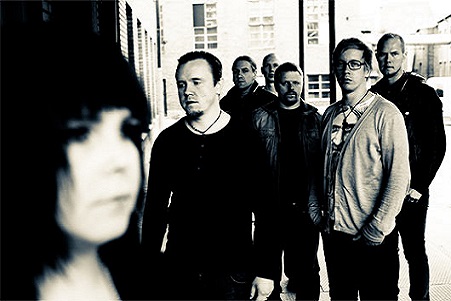“Low-key” is probably a description most bands would resist. Save for the willingly obscure and/or shadowy (read: bands who keep their identities hidden), acting in such a fashion is a virtual death-knell in this attention-grabbing-at-all-costs climate. You almost have to go out of your way to get noticed – there are simply too many bands to compete with. But for Finnish atmospheric rock/metallers The Chant, the low-key approach is right in line with their thought-provoking, introspective music. There are no bells and whistles with the Finns, just well-honed, mature, refined, and captivating metal, something that’s easy to get in touch with via their fourth album, New Haven.
“Growing a fanbase is a slow process unless you have tons of money to spend on advertising and such,” begins guitarist Kimmo Tukiainen. “Also, we haven’t actively done that much in the past to actually get fans. No publicity stunts or anything. We like to keep whatever comes out of the band related to the music itself. I quests if we had obvious quirks in how we look or what we say it would be easier to attract attention. But even through the natural evolvement of things, we still have potential for being a bigger band.”
Tukiainen is right – The Chant have the potential to reach a much wider audience even outside of the bounds of metal (one would think the expanding Anathema crowd would be a good starting point.) Unlike the steely Brits, The Chant never went through a period of self-realization and gradual shedding of metallic elements. They’ve always had their sound in place, even going back to their sterling 2008 debut, Ghostlines. “Our core sound and the fundamental ideas of the music are pretty much the same on Ghostlines,” admits the guitarist. “The melodies and harmonies and general concepts of the songs are similar. I guess otherwise it wouldn’t sound like The Chant anymore. What’s changed though is that we have gone further and deeper in how we express those musical ideas as well as gone forward as a band and incorporated new elements to our music. I guess we might have been a bit afraid that Ghostlines would not sound as good as we want, so we had a relatively high quality production on it. We had a producer checking that we were doing everything correctly and a recording engineer recording what we played. We learned quite a lot from that experience and nowadays we do the majority of the recording by ourselves.”
New Haven, in relation to its A Healing Place predecessor, is a darker, savvier album. While A Healing Place had its occasional moments of pristine rock and soft hooks, New Haven plunges the band back down into the unforgiving depths heard on their early works. Appropriately, cuts like “Falling Kind” and “Earthen” instantly resonate.
“We tried to do a darker, heavier album already on A Healing Place, but the songs themselves directed us to a bit softer expression on that album,” says Tukiainen. “We could have forced it but it felt more sincere going with the direction that the songs started taking. On New Haven we had the same idea on the back of our heads already earlier so I guess the initial compositions themselves were more compatible with a darker and heavier expression. We also didn’t want the heaviness to be stereotypical as in ‘heavy metal’ but something a bit more refined.
“Both ‘Cloud Symmetry’ and ‘Earthen’ have rhythmic ideas which I find interesting,” he continues. “Also, ‘Minotaur’ opened up to me a lot when we were shooting its music video. We were involved in the video shoot for many days, listening to the song over and over again and so the song and its lyrics became ingrained into my head. I had read the lyrics a couple of times before that, but somehow I started thinking about what is actually said in the song and what it means and it became a really meaningful song for me. I guess that’s how our music is best served. A bit of repetition and thought work.”
A general topic that emerges with any Finnish band playing melancholic music is the correlation between the darkness presented and the everyday lives of Finns in general. It’s something of a cliché, almost, that Finnish people typically have a “mood” about them that reflects melancholy and life’s more glum facets. When faced with near-day long darkness, oppressive weather, and the regular influx of drink during this time, one can see where metal ripe for this setting would come in.
“At least it’s a perhaps a self-fulfilling stereotype about the Finns that we are depressed and quiet people who are into dark, melancholic music,” lends Tukiainen. “I feel that the taste for our kind of music is not most of the time tied to a fixed personality trait or geographical location. I would say that basically anyone can have the kinds of thoughts that our music goes really well with. So in a sense, I see the taste for melancholic music just one of the aspects of music and life in general. Listening to melancholic music can be in a way really helpful or even therapeutic sometimes.”
On a bit of a sunnier note, Tukiainen says most inhabitants of Finland spend the year looking toward the summer, where indeed the sun decides to come out, and the mood lightens considerably. These are things we take for granted, but in Finland, it’s a time to relish.
“Once the sun starts shining and it’s warm like today, a lot of people seem to have this nervous energy from the summer finally being here. Young adults party a lot and lose track of time in the nightless night. Older adults go to summer cottages and relax in the sun as fast and hard as they can. All knowing it’s going to be September soon…”


